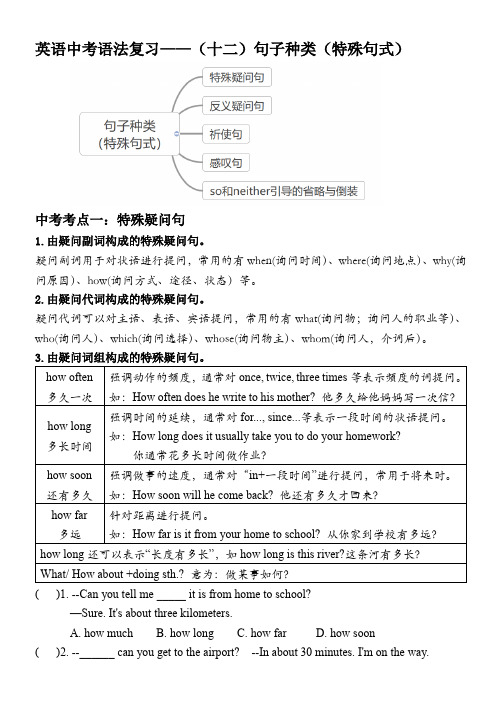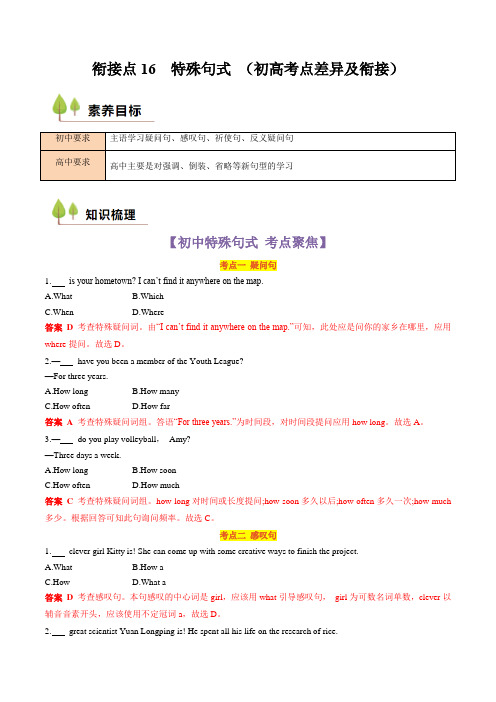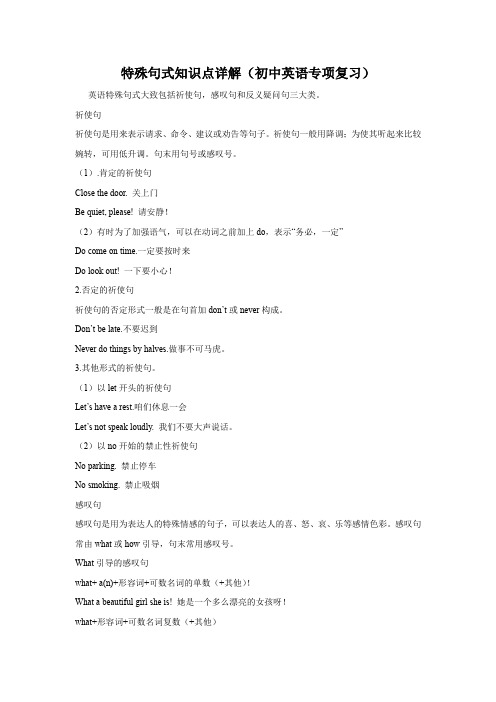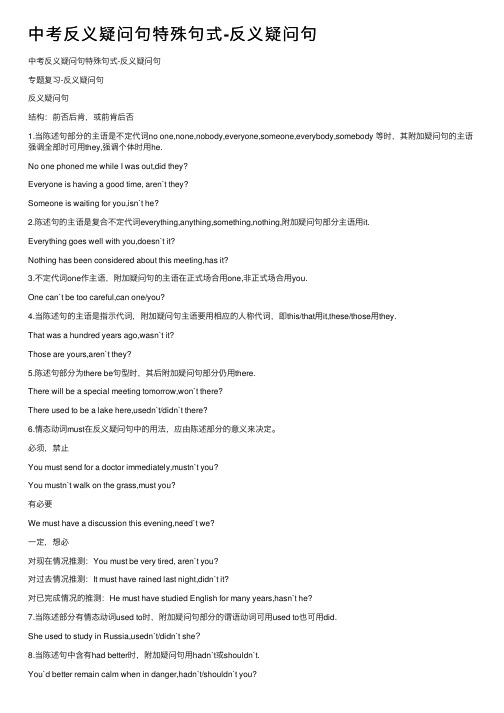中考反义疑问句 特殊句式-反义疑问句
中考英语专题复习计划反义疑问句知识讲解

不,他们工作不努力
〔2〕They don’t wor
k hard, do they?
他们不太努力工作,是吗?
Yes, they do.
不,他们工作努力。
/No, they don't.
是的, 他们工作不努力
否认反义疑问句的答复
当陈述局部为必然式,反义疑问句为否认式时,其答复一般不会造成困难,一般只需照情况答复即可:
用来表示对现在的情况进行推测还是用来表示对过去的情况进行推测,附加问句都能够mustn't。该文举了假设干
个实例,从而改变了人们对这一用法的看法。
答复反意疑问句的答复:前肯后否,前否后肯,依照事实从后往前翻译。如:
(1〕They work hard,don’t they?他们努力工作,不是吗?
Yes, they do.
陈述局部和疑问局部要么前肯后否,要么前否后肯。这类反义疑问句有时带有感情色彩,表示惊诧,气愤,
挖苦,不钦佩等。比方:You call this a day's work
,don't you
?你说这就叫一天的活儿,不是吗?
1
什么是反义疑问句
4
速记方法
7其他信息
2
反义疑问句的答案
5
主语一般词语
3
句子结构
Let’s have a look on your book
,
shall we?
3)当陈述句可否认的祈使句时,问句可用
will you
或can you
。
e.g. don
’t make much noise, will/can you?
初中英语反意疑问句规则

初中英语反意疑问句规则
初中英语中,反意疑问句的规则如下:
1.反意疑问句是由一个陈述句和一个简短的疑问句组成的,两者用逗号分隔。
2.如果陈述句是肯定的,反意疑问句的疑问部分就使用否定形式;如果陈述句是否定的,疑问部分则使用肯定形式。
3.如果陈述句中使用了情态动词或助动词,疑问部分使用这些词的原形,并且在句末加上主语。
4. 如果陈述句中没有情态动词或助动词,疑问部分使用
do/does/did加上not或短语动词中的not,并且在句末加上主语。
5. 如果陈述句中有两个主语,疑问部分使用which而不使用who。
6.如果陈述句中有其中一种程度的副词或表示祈使句的动词,疑问部分使用这些词,并且在句末加上主语。
以下是一些例句:
1. You don't like ice cream, do you?
2. He can't swim, can he?
3. She has finished her homework, hasn't she?
4. They didn't go to the park, did they?
5. Tom and John are playing basketball, aren't they?
6. Be careful, will you?。
英语中考语法复习——句子种类(特殊句式)

英语中考语法复习——(十二)句子种类(特殊句式)中考考点一:特殊疑问句1.由疑问副词构成的特殊疑问句。
疑问副词用于对状语进行提问,常用的有when(询问时间)、where(询问地点)、why(询问原因)、how(询问方式、途径、状态)等。
2.由疑问代词构成的特殊疑问句。
疑问代词可以对主语、表语、宾语提问,常用的有what(询问物;询问人的职业等)、who(询问人)、which(询问选择)、whose(询问物主)、whom(询问人,介词后)。
how often 多久一次强调动作的频度,通常对once, twice, three times等表示频度的词提问。
如:How often does he write to his mother? 他多久给他妈妈写一次信?how long 多长时间强调时间的延续,通常对for..., since...等表示一段时间的状语提问。
如:How long does it usually take you to do your homework?你通常花多长时间做作业?how soon 还有多久强调做事的速度,通常对“in+一段时间”进行提问,常用于将来时。
如:How soon will he come back? 他还有多久才回来?how far 多远针对距离进行提问。
如:How far is it from your home to school? 从你家到学校有多远?how long还可以表示“长度有多长”,如how long is this river?这条河有多长?What/ How about +doing sth.? 意为:做某事如何?( )1. --Can you tell me _____ it is from home to school?—Sure. It's about three kilometers.A. how muchB. how longC. how farD. how soon( )2. --______ can you get to the airport? --In about 30 minutes. I'm on the way.A. How soonB. How longC. How muchD. How often( )3. --______ have you worked here? —For just one month.A. How oftenB. How longC. How soonD. How much( )4. --We don't have much homework this weekend. Shall we go out together?—OK. What about_______A. to see B seeing C. to see D. sees中考考点二:反义疑问句A. 反义疑问句的标准形式反义疑问句的标准形式是。
超实用初升高英语无忧衔接:衔接点16 特殊句式 (初高考点差异及衔接)(解析版)

衔接点16 特殊句式(初高考点差异及衔接)初中要求主语学习疑问句、感叹句、祈使句、反义疑问句【初中特殊句式考点聚焦】考点一疑问句1. is your hometown? I can’t find it anywhere on the map.A.WhatB.WhichC.WhenD.Where答案D考查特殊疑问词。
由“I can’t find it anywhere on the map.”可知,此处应是问你的家乡在哪里,应用where提问。
故选D。
2.—have you been a member of the Youth League?—For three years.A.How longB.How manyC.How oftenD.How far答案A考查特殊疑问词组。
答语“For three years.”为时间段,对时间段提问应用how long。
故选A。
3.—do you play volleyball,Amy?—Three days a week.A.How longB.How soonC.How oftenD.How much答案C考查特殊疑问词组。
how long对时间或长度提问;how soon多久以后;how often多久一次;how much 多少。
根据回答可知此句询问频率。
故选C。
考点二感叹句1. clever girl Kitty is! She can come up with some creative ways to finish the project.A.WhatB.How aC.HowD.What a答案D考查感叹句。
本句感叹的中心词是girl,应该用what引导感叹句,girl为可数名词单数,clever以辅音音素开头,应该使用不定冠词a,故选D。
2. great scientist Yuan Longping is! He spent all his life on the research of rice.A.WhatB.What aC.HowD.How a答案B考查感叹句。
初中英语反义疑问句归纳总结大全

反义疑问句1,反义疑问句的基本形式常见的反义疑问句分为前肯后否和前否后肯两种形式,即如果陈述部分是肯定结构,反义疑问句部分就用否定结构,反之亦然。
反义疑问句部分主要用代词,并与前句主语一致谓语动词在人称,数,和时态上也要与前句一致.He goes to work on foot, doesn’t he?2,反义疑问句部分主语及谓语的确定简略问句部分主语与谓语的确定应以陈述部分的主语和谓语为依据,尤其要注意一些特殊的情况。
同时,简略问句部分的主语一般应用人称代词,而动词若为否定形式,则一般应用缩略形式。
(1)当陈述部分的主语为this, that,则用it。
当these,those时,则用they。
This is a green jeep,isn’t it?Those aren't banana trees, are they?(2)当陈述部分为I am形式时, 附加问句用aren’t I.I'm right, aren’t I?(3)当陈述部分是There be结构时,用be there。
There was an English film yesterday,wasn’t there?(4)当陈述部分有never,seldom,no,few,little, nothing, nobody, hardly,none,too…to。
等表示你否定意义的词时,反义疑问部分用肯定形式。
He seldom goes to the cinema,does he?(5),如果陈述部分含有表示否定意义的由前词缀或后缀构成的词(dislike,unfair,unhappy, careless,unlike,impossible,impolite, impossible等),疑问部分用否定形式。
She dislikes the idea, doesn't she?It’s unfair,isn’t it?(6)主语是不定代词的反义疑问句1)当陈述部分的主语为everthing,nothing,anything, something等指事/物的不定代词时,疑问部分主语用it,而不用they。
中考英语语法考点知识复习-反义疑问句

反意疑问句反意疑问句是由两部分组成的,前一部分是对事物的陈述(即陈述句),后一部分是简短的提问(即简短疑问句),中间用逗号隔开。
如果前一部分用肯定句,后一部分就用否定疑问句;如果前一部分用否定句,后一部分就用肯定疑问句。
两部分的人称和时态要一致。
其回答是用yes或no来表示。
一、含be(is, are, was, were)动词的反意疑问句其句型是:句型1:主语+ be+其它,isn’t(aren’t, wasn’t, weren’t)+ 主语?句型2:主语+ be not+其它,is(are, was, were) + 主语?① You are from America, aren’t you? Yes, I am. No, I’m not.② It isn’t very cold today, is it? Yes, it is. No, it isn’t.③ Tom was away yesterday, wasn’t he? Yes, he was. No, he wasn’t.④ The Green weren’t at home last nigh t, were they?Yes, they were. No, they weren’t.⑤ Mary is reading English now, isn’t she? Yes, she is. No, she isn’t.⑥ Your parents aren’t going to have a party this Sunday, are they?Yes, they are. No, they aren’t.⑦ Th e girls were singing when the teacher came in, weren’t they?Yes, they were. No, they weren’t.注意:There be句型① There is an old picture on the wall, isn’t there?Yes, there is. No, there isn’t.② There aren’t any children in the room, are there?Yes, there are. No, there aren’t.③ There wasn’t a telephone call for me, was there?Yes, there was. No, there wasn’t.④ There were enough people to pick apples, weren’t there?Yes, there were. No there weren’t.二、行为动词的一般现在时的反意疑问句其句型是:句型1: 主语+动词原形+其它,don’t I(you, we, they)?句型2: 主语+ don’t+动词原形+其它,do I(you, we, they)?句型3: 主语+动词第三人称单数+其它,doesn’t he(she, it)?句型4: 主语+ doesn’t+动词原形+其它,doeshe(she, it)?① You often watch TV in the evening, don’t you? Yes, I do. No, I don’t.② The students don’t study hard, do they? Yes, they do. No, they don’t.③ Mary studies Chinese hard, doesn’t she? Yes, she does. No, she doesn’t.④ The boy doesn’t often go to school by bike, does he?Yes, he does. No, he d oesn’t.⑤The first class begins at eight, doesn’t it? Yes, it does. No, it doesn’t.三、行为动词的一般过去时的反意疑问句其句型是:句型1: 主语+动词过去式+其它,didn’t+主语?句型2: 主语+didn’t+动词原形+其它,did +主语?① You watched TV last night, didn’t you? Yes, I did. No, I didn’t.②Jim’s parents didn’t go to Hong Kong last month, did they?Yes, they did. No, they didn’t.③ The rain stopped, didn’t it? Yes, it did. No, it didn’t.④Mr. Clarke didn’t buy a car, didn’t he? Yes, he did. No, he didn’t.四、一般将来时的反意疑问句其句型是:句型1: 主语+will+动词原形+其它,won’t+主语?句型2: 主语+ won’t +动词原形+其它,will +主语?①The boys will play games, won’t they? Yes, they will. No, they won’t.② It won’t stop raining, will it? Yes, it will. No, it won’t.③ Mr. Smith will visit our school next week, won’t he? Yes, he will. No, he won’t.注意:There be句型的一般将来时① There will be a basketball match tomorrow, won’t there?Yes, there will. No, there won’t.② There won’t be too much pollution in the future, will there?Yes, there will. No, there won’t.五、现在完成时的反意疑问句其句型是:句型1: 主语+have+动词过去分词+其它,haven’t+主语?句型2: 主语+ haven’t +动词过去分词+其它,have +主语?句型3: 主语+has+动词过去分词+其它,hasn’t+主语?句型4: 主语+ hasn’t +动词过去分词+其它,has +主语?① You have been to Shanghai before, haven’t you? Yes I have. No, I haven’t.② You haven’t been to Shanghai before, have you? Yes I have. No, I haven’t.③Jack has done his homework, hasn’t he? Yes, he has. No, he hasn’t.④Jack hasn’t done his homework, has he? Yes, he has. No, he hasn’t.六、现在完成进行时的反意疑问句其句型是:句型1: 主语+have been+动词现在分词+其它,haven’t+主语?句型2: 主语+ haven’t been +动词现在分词+其它,have +主语?句型3: 主语+has been +动词现在分词+其它,hasn’t+主语?句型4: 主语+ hasn’t been +动词现在分词+其它,has +主语?① You have been skating for five hours, haven’t you? Yes, I have. No, I haven’t.② You haven’t been skating for five hours, have you? Yes, I have. No, I haven’t.③ Bob has been collecting kites since 1999, hasn’t he? Yes, he has. No, he hasn’t.④ Bob hasn’t been collecting kites since 1999, has he? Yes, he has. No, he hasn’t.七、含有情态动词的反意疑问句其句型是:句型1: 主语+情态动词+动词原形+其它,情态动词否定形式+主语?句型2: 主语+情态动词否定形式+动词原形+其它,情态动词+主语?① You can speak French, can’t you? Yes, I can. No, I can’t.②They can’t understand me, can they? Yes, they can. No, th ey can’t.③ Ann could swim when she was six, couldn’t she? Yes, she could. No, she couldn’t.④ The students must study hard, mustn’t they? Yes, they must. No, they needn’t.注意:You must go home now, needn’t you? Yes, I must. No, I needn’t.★值得注意的是有时英语的谓语动词并不用否定式(即没加上not),而是用上了“never, little, few, hardly, nothing, nobody”等词,这时该陈述句也属于否定句,因此,反意疑问句的后半部分应用肯定疑问式。
特殊句式知识点详解(初中英语专项复习)1

特殊句式知识点详解(初中英语专项复习)英语特殊句式大致包括祈使句,感叹句和反义疑问句三大类。
祈使句祈使句是用来表示请求、命令、建议或劝告等句子。
祈使句一般用降调;为使其听起来比较婉转,可用低升调。
句末用句号或感叹号。
(1).肯定的祈使句Close the door. 关上门Be quiet, please! 请安静!(2)有时为了加强语气,可以在动词之前加上do,表示“务必,一定”Do come on time.一定要按时来Do look out! 一下要小心!2.否定的祈使句祈使句的否定形式一般是在句首加don’t或never构成。
Don’t be late.不要迟到Never do things by halves.做事不可马虎。
3.其他形式的祈使句。
(1)以let开头的祈使句Let’s have a rest.咱们休息一会Let’s not speak loudly. 我们不要大声说话。
(2)以no开始的禁止性祈使句No parking. 禁止停车No smoking. 禁止吸烟感叹句感叹句是用为表达人的特殊情感的句子,可以表达人的喜、怒、哀、乐等感情色彩。
感叹句常由what或how引导,句末常用感叹号。
What引导的感叹句what+ a(n)+形容词+可数名词的单数(+其他)!What a beautiful girl she is! 她是一个多么漂亮的女孩呀!what+形容词+可数名词复数(+其他)what important jobs they have done! 他们做了多么重要的工作呀!what+形容词+不可数名字(+其他)what fine weather it is! 多好的天气呀!How引导的感叹句(1)how+形容词或副词(+其他)How interesting the dog is ! 多么有趣的狗呀!(2)how+形容词+a(an)+可数名词单数(+其他)!How useful a subject they are learning! 他们正在学的科目多么有用呀!how+ 主语+谓语(+其他)How time flies! 时间过得真快呀!3. 有时一个陈述句、疑问句、祈使句,甚至一个词或词组,都可以成为感叹句来表示强烈的感情,这时句末用感叹号。
初中英语反义疑问句中考复习(精心整理,很好!!!)

初中英语反义疑问句中考复习一、反意疑问句的回答回答时,事实是肯定的用Yes;若事实是否定的则用No。
二、反意疑问句反意疑问句是由陈述句和附在其后的附加疑问句组成。
其中附加疑问句是对陈述句所说的事实或观点提出疑问,起证实作用,一般用于证实说话者所说的事实或观点。
(表示说话者对某事有一定看法,但又不完全确定,需要对方加以证实。
)翻译为“是吗”三、反意疑问句的特殊情况1.附加问句的主语应与陈述句的主语保持一致,且只能用人称代词替代。
You come from Beijing, don't you?你来自北京,是不是?2.反意疑问句中问句部分的动词与陈述部分的动词在语气上成相反的对应关系,即:肯定+否定?否定+肯定?You can’t do it, can you?你不能做它,是吗?They are very late for the meeting, aren’t they?他们开会迟到了,是吗?3.have的不同用法,反义疑问句用不同的动词(1)have 表“有”时,反义疑问句谓语动词用have/do都行He has a new car, doesn’t/hasn’t he?(2)have表“吃,喝,玩,度过,举办”等是,反义疑问句谓语动词用doHe has supper at home every day, doesn’t he?They had a good time in Beijing, didn’t they?(3)have to表“不得不,必须”时,反义疑问句谓语动词用doKite has to help her mother, doesn’t she?(4)had better表“最好”时,反义疑问句谓语动词用hadWe had better go to school at once, hadn't we?(5)have用在完成时中,反义疑问句谓语动词用haveThey have known the matter, haven’t they?4.当陈述句中含有be动词,助动词,或是情态动词时,反问句部分由这些词加上主语人称代词构成:Be动词包括:am, is, are, was, were助动词有:do, does, did, have(用在完成时), has(用在完成时)等情态动词有:can, could, may, might, must, will, would, shall, should He will go home, won’t he?他要回家了,是吗?She doesn’t like to eat popcorn, does she?她不喜欢吃爆米花,是吗?5.(1)当陈述部分所含的否定词是通过加前缀或后缀构成的,(也就是有un, dis-前缀、less-后缀等含有词缀而意思否定的词),当做肯定句处理,其后的反意疑问句依然用否定结构。
反义疑问句特殊句式

反意疑问句19条:1) 陈述局部的主语是I,疑问局部要用aren't I.I'm as tall as your sister,aren't I?2) 陈述局部的谓语是wish,疑问局部要用may +主语。
I wish to have a word with you, may I?3) 陈述局部用no, nothing, nobody, never, few, seldom, hardly, rarely, little等否认含义的词时,疑问局部用肯定含义。
The Swede made no answer, did he / she?Some plants never blown (开花), do they ?4) 含有ought to 的反意疑问句,陈述局部是肯定的,疑问局部用shouldn't / oughtn't +主语。
He ought to know what to do, oughtn't he? / shouldn't he?5) 陈述局部有have to +v. (had to + v.),疑问局部常用don't +主语〔didn't +主语〕。
We have to get there at eight tomorrow, don't we?6) 陈述局部的谓语是used to 时,疑问局部用didn't +主语或usedn't +主语。
He used to take pictures there, didn't he? / usedn't he?7) 陈述局部有had better + v. 疑问句局部用hadn't you?You'd better read it by yourself, hadn't you?8) 陈述局部有would rather +v.,疑问局部多用wouldn't +主语。
中考英语备课指导:反义疑问句 特殊句式-反义疑问句

中考反义疑问句特殊句式-反义疑问句专题复习-反义疑问句反义疑问句结构:前否后肯,或前肯后否1.当陈述句部分的主语是不定代词no one,none,nobody,everyone,someone,everybody,somebody 等时,其附加疑问句的主语强调全部时可用they,强调个体时用he.No one phoned me while I was out,did they?Everyone is having a good time, aren`t they?Someone is waiting for you,isn`t he?2.陈述句的主语是复合不定代词everything,anything,something,nothing,附加疑问句部分主语用it.Everything goes well with you,doesn`t it?Nothing has been considered about this meeting,has it?3.不定代词one作主语,附加疑问句的主语在正式场合用one,非正式场合用you.One can`t be too careful,can one/you?4.当陈述句的主语是指示代词,附加疑问句主语要用相应的人称代词,即this/that用it,these/those用they.That was a hundred years ago,wasn`t it?Those are yours,aren`t they?5.陈述句部分为there be句型时,其后附加疑问句部分仍用there.There will be a special meeting tomorrow,won`t there?There used to be a lake here,usedn`t/didn`t there?6.情态动词must在反义疑问句中的用法,应由陈述部分的意义来决定。
中考反义疑问句特殊句式-反义疑问句

中考反义疑问句特殊句式-反义疑问句中考反义疑问句特殊句式-反义疑问句专题复习-反义疑问句反义疑问句结构:前否后肯,或前肯后否1.当陈述句部分的主语是不定代词no one,none,nobody,everyone,someone,everybody,somebody 等时,其附加疑问句的主语强调全部时可⽤they,强调个体时⽤he.No one phoned me while I was out,did they?Everyone is having a good time, aren`t they?Someone is waiting for you,isn`t he?2.陈述句的主语是复合不定代词everything,anything,something,nothing,附加疑问句部分主语⽤it.Everything goes well with you,doesn`t it?Nothing has been considered about this meeting,has it?3.不定代词one作主语,附加疑问句的主语在正式场合⽤one,⾮正式场合⽤you.One can`t be too careful,can one/you?4.当陈述句的主语是指⽰代词,附加疑问句主语要⽤相应的⼈称代词,即this/that⽤it,these/those⽤they.That was a hundred years ago,wasn`t it?Those are yours,aren`t they?5.陈述句部分为there be句型时,其后附加疑问句部分仍⽤there.There will be a special meeting tomorrow,won`t there?There used to be a lake here,usedn`t/didn`t there?6.情态动词must在反义疑问句中的⽤法,应由陈述部分的意义来决定。
中考英语专项----反义疑问句

中考反意疑问句“大揭秘”定义:在陈述句之后附加上一个简短问句,对陈述句所叙述的事实提出相反的疑问,这种疑问句叫做反意疑问句。
结构:如陈述部分为肯定式,疑问部分用否定式。
反之,如陈述部分否定式,疑问部分用肯定式。
陈述句和后边的反意疑问句的主语以及谓语动词的人称、数、时态通常要保持一致。
回答:.对反意疑问句的回答,肯定或否定要前后保持一致,即前面用“ yes ”,后面必须是肯定;前面用“no ”,后面必须是否定。
注意:在回答前否定(陈述句)+后肯定(简略问句)的反意疑问句时,答语中“yes ”和“no”的翻译恰好与汉语相反,如:He isn't a pianist, is he? 他不是钢琴家,是吗?Yes , he is . (No, he isn't.) 不,他是钢琴家。
(对,他不是钢琴家。
)以下分三个方面介绍20种特殊的反意疑问句变化形式:一、陈述部分是简单句1、陈述部分是I am 时,,反意疑问句用aren't I 或ain't I。
如:I am strong and healthy , aren't I。
I'm working now, ain't I? 我在工作,是吗?I'm late, aren't I? 我迟到了,是吗?2、陈述部分的主语是everything, nothing, anything或something 时,反意疑问句的主语应用代词it。
例如:Everything seems all right now, doesn't it? 一切看起来都正常,对吗?Nothing could make him give in, could it? 什么也不会使它屈服,是吗?Something is wrong with my radio, isn't it? 我的收音机出毛病了,是吧?3、陈述部分的主语是everybody, everyone, anybody, anyone, somebody, someone, nobody, no one, none, neither 时, 其反意疑问句的主语需用复数代词they。
中考反义疑问句 特殊句式-反义疑问句

中考反义疑问句特殊句式-反义疑问句专题复习-反义疑问句反义疑问句结构:前否后肯,或前肯后否1.当陈述句部分的主语是不定代词no one,none,nobody,everyone,someone,everybody,somebody 等时,其附加疑问句的主语强调全部时可用they,强调个体时用he.No one phoned me while I was out,did they?Everyone is having a good time, aren`t they?Someone is waiting for you,isn`t he?2.陈述句的主语是复合不定代词everything,anything,something,nothing,附加疑问句部分主语用it.Everything goes well with you,doesn`t it?Nothing has been considered about this meeting,has it?3.不定代词one作主语,附加疑问句的主语在正式场合用one,非正式场合用you.One can`t be too careful,can one/you?4.当陈述句的主语是指示代词,附加疑问句主语要用相应的人称代词,即this/that用it,these/those用they.That was a hundred years ago,wasn`t it?Those are yours,aren`t they?5.陈述句部分为there be句型时,其后附加疑问句部分仍用there.There will be a special meeting tomorrow,won`t there?There used to be a lake here,usedn`t/didn`t there?6.情态动词must在反义疑问句中的用法,应由陈述部分的意义来决定。
中考英语考点之反意疑问句

中考英语考点之反意疑问句一、反意疑问句的结构:陈述句 + 附加疑问句?It’s hot today ,isn’t it ?二、反意疑问句的肯定与否定原则:1.前肯后否,前否后肯2.前名后代3.时态一致三、特殊的附加疑问句:1.Let’s的反意疑问句为 shall we ?Let’s go to the movie together ,_____ _____ ?2.祈使句的反意疑问句为 will you ?Don’t miss it ,_____ _____ ?3.若陈述句部分含有never , few , little , hardly ,no ,seldom ,nobody ,nothing …否定词、半否定词时,附加疑问句用肯定形式。
He can hardly understand it , _____ ______ ?四、反意疑问句的主语与助动词1.陈述句的主语为不定代词时:1).主语为指人的不定代词时,附加疑问句的主语用he / they .No one was hurt , ______ _______ ?2).主语为指物的不定代词时,附加疑问句的主语用 it.Nothing is serious , _______ _______ ?2.陈述句的主语是this , that , these , those时,附加疑问句的主语分别为 it , they .This is a new computer , ______ ______ ?Those aren’t banana tees , ______ _______ ?3.当陈述句是主从复合句时,其附加疑问句应与主句保持一致。
若主句为I think / believe /suppose /imagine /expect时,其附加疑问句应与从句保持一致。
He said that he would leave here tomorrow , _______ _______ ?I don’t think you can do these exercises alone , _______ _______ ?4.表推测的情态动词的附加疑问句,其附加疑问句与情态动词后的动词一致。
- 1、下载文档前请自行甄别文档内容的完整性,平台不提供额外的编辑、内容补充、找答案等附加服务。
- 2、"仅部分预览"的文档,不可在线预览部分如存在完整性等问题,可反馈申请退款(可完整预览的文档不适用该条件!)。
- 3、如文档侵犯您的权益,请联系客服反馈,我们会尽快为您处理(人工客服工作时间:9:00-18:30)。
中考反义疑问句特殊句式-反义疑问句专题复习-反义疑问句反义疑问句结构:前否后肯,或前肯后否1.当陈述句部分的主语是不定代词no one,none,nobody,everyone,someone,everybody,somebody 等时,其附加疑问句的主语强调全部时可用they,强调个体时用he.No one phoned me while I was out,did they?Everyone is having a good time, aren`t they?Someone is waiting for you,isn`t he?2.陈述句的主语是复合不定代词everything,anything,something,nothing,附加疑问句部分主语用it.Everything goes well with you,doesn`t it?Nothing has been considered about this meeting,has it?3.不定代词one作主语,附加疑问句的主语在正式场合用one,非正式场合用you.One can`t be too careful,can one/you?4.当陈述句的主语是指示代词,附加疑问句主语要用相应的人称代词,即this/that用it,these/those用they.That was a hundred years ago,wasn`t it?Those are yours,aren`t they?5.陈述句部分为there be句型时,其后附加疑问句部分仍用there.There will be a special meeting tomorrow,won`t there?There used to be a lake here,usedn`t/didn`t there?6.情态动词must在反义疑问句中的用法,应由陈述部分的意义来决定。
必须,禁止You must send for a doctor immediately,mustn`t you?You mustn`t walk on the grass,must you?有必要We must have a discussion this evening,need`t we?一定,想必对现在情况推测:You must be very tired, aren`t you?对过去情况推测:It must have rained last night,didn`t it?对已完成情况的推测:He must have studied English for many years,hasn`t he?7.当陈述部分有情态动词used to时,附加疑问句部分的谓语动词可用used to也可用did.She used to study in Russia,usedn`t/didn`t she?8.当陈述句中含有had better时,附加疑问句用hadn`t或shouldn`t.You`d better remain calm when in danger,hadn`t/shouldn`t you?9.当陈述句中含有have to时,附加疑问句部分的助动词用do或者陈述句中助动词的相应形式.We have to get up at four tomorrow,don`t we?You will have to wait for him,won`t you?10.当陈述句部分主句带有no,never,nothing,nowhere,rarely,hardly,seldom,few,little等否定或半否定词时,附加疑问句一般用肯定式;若陈述部分带了否定词缀的派生词,如:helpless,hopeless,dislike,useless,unable,unfair等时,附加疑问句则用否定形式.You have never read Gorky`s works,have you?Jane is disappointed,isn`t she?You dislike playing the piano,don`t you?11.肯定祈使句后面的附加疑问句一般用will you或won`t you.Leave all the things as they are,will you/won`t you?Give me a hand,will you/won`t you?12.以let`s开头的祈使句,附加疑问句部分要用shall we;而以let me/us 开头的祈使句,附加疑问句部分用will you.Let`s try another way,shall we?Let us have a try,will you?13..当陈述部分是否定的祈使句时,附加疑问句部分除了用will you外,也可用can you,此时附加疑问句部分必须是肯定式。
Don`t make much noise,will you/can you?14.当陈述部分是并列句,附加疑问句与邻近分句一致.Bob speaks English,but his wife speaks German,doesn`t she?15..当陈述句部分是一个主从复合句,附加疑问句与主句一致。
当陈述部分是I`m sure,I`m afraid,I don`t think(imagine,expect,suppose等)时,附加疑问句与从句一致,否定转移。
He said that Mary was late for the lecture,didn`t he?I don`t think she can finish it on her own,can she?真题再现1.Nancy,sweep the classroom,__________?A.don`t youB.do youC.will youD.doesn`t she2.We have to finish the work now,_________?A.don`t weB.haven`t weC.have weD.do we3.The news reported that the rainstorm was in the area last night.Yes._______bad weather it was!A.What aB.How aC.whatD.How4.-_______do you go to the cinema?-Once a month.A.How longB.How farC.How oftenD.How much5.-____________?-He is not very heavy and wear glasses.A.What does Ron look likeB.What is RonC.What do you think of RonD.How is Ron6.________clever the boy is!A.HowB.WhatC.What a7. Do you want to be healthy? ________.Smiling can help you say healthy.A.SmileB.SmilingC.To smileD.Smiled8.-_________is it from the village to your farm?-About 10 minutes` walk.A.How oftenB.How soonC.How longD.How far9._________great picture! Who painted it?A.HowB.WhatC.How aD.What a10.-He didn`t go to the corner yesterday,did he?-_________.He was busy studying for the tests all day.A.No,he didn`tB.Yes,he didC.No,he didD.Yes,he didn`t11.___________something wrong with my bike. Can I use yours?A.It isB. It wasC.There isD.There was12.-You haven`t been to the West Lake,have you?-____________. But I will go there with my parents this summer vacation.A.No,I haven`tB.No,I didn`tC.Yes,I haveD.Yes,I did13. Don`t copy other`s homework anymore!_____________,Miss Smith.A.OK,I willB.Sorry,I won`tC.OK,I don`t14.________keep water running when you are brushing your teeth or washing your hands,Jack.OK. I know we must save every drop of water.A.Why notB.pleaseC.Don`t15.-You like listening to Sally`s songs,don`t you?-___________.She has a sweat voice.A.Yes,I doB.Yes,she doesC.No,I don`tD.No, she doesn`t强化训练1.He is not honest. ________believe him.A.NotB.Don`tC.To notD.Not to2.If you want to say,let me know,______?A.will youB.Shall weC.do youD.do we3.Never come again,________?A.will youB.won`t youC.do youD.does he4.Nothing is difficult if you out your heart into it,_______?A.aren`t theyB.isn`t itC.is it D,are they5.________loving weather we are having these days!A.HowB.How anC.What What an6.____________information he offered us! We all thank him.A .What useful B.What useless C.How useful D.How useless7.-You haven`t ever been to Shanghai,have you?-________. This is the first time.A.Yes,I haveB.Yes,I haven`tC.No,I haveD.No,I haven`t8.-________is your maths teacher?-The one in red.A.WhatB.WhereC.WhichD.How9.-The boy has to stay at home to look after his little sister,______?-Yes,because his mother has gone shopping.A.does heB.is heC.doesn`t heD.hasn`t he10._______cold it is today!A.WhatB.HowC.What aD.How a答案:真题答案CACCAAADDACABCA强化答案BAACCADCCB二、英语书面表达专项训练2.李华的英国笔友Jessica来信说, 她想了解中国的传统节日中秋节。
